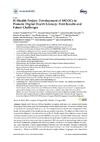Please use this identifier to cite or link to this item:
https://accedacris.ulpgc.es/jspui/handle/10553/74274
| Title: | IC-health project: Development of MOOCs to promote digital health literacy: First results and future challenges | Authors: | Perestelo-Perez, Lilisbeth Torres-Castaño, Alezandra González-González, Carina Alvarez-Perez, Yolanda Toledo-Chavarri, Ana Wägner, Anna Maria Claudia Perello, Michelle Van Der Broucke, Stephan Díaz Meneses, Gonzalo Piccini, Barbara Rivero-Santana, Amado Serrano-Aguilar, Pedro |
UNESCO Clasification: | 120310 Enseñanza con ayuda de ordenador 580101 Medios audiovisuales 3212 Salud pública |
Keywords: | Co-Creation Digital Health Literacy Ehealth Moocs Open Education, et al |
Issue Date: | 2020 | Project: | Improving digital health literacy in Europe | Journal: | Sustainability (Switzerland) | Abstract: | Digital health literacy (DHL) is the ability to search, understand and evaluate information from digital media and apply that knowledge to solve health problems. However, currently many citizens have not developed these skills, and this compromises not only the self-management of their health, but the possibility that health services are socially sustainable. The objective of this article was to present the objectives, activities and results of the IC-Health project whose objective was to develop a series of massive open online courses (MOOCs) to improve the DHL skills of European citizens. An exploratory report on DHL's current evidence was developed. Furthermore, a survey, focus groups and group interviews were conducted to determine DHL levels and the needs of population cohorts (children; adolescents; pregnant and lactating women; the elderly; and people affected by type 1 and type 2 diabetes). A participation strategy with end users was designed through a community of practice for the creation of MOOCs with the seven European countries that participated in the consortium. Thirty-five MOOCs were developed in eight different languages and a descriptive and exploratory assessment of MOOCs was conducted with new participants. This first evaluation indicated that MOOCs can be an effective educational resource for DHL and a facilitator of shared decision-making processes. The process of co-creation ofMOOCs, the components, the challenges and the opportunities identified in this European project could be useful for other developers of MOOCs who want to co-create interventions with beneficiaries in similar settings. Further longer-term actions are still needed to improve citizens' DHL. | URI: | https://accedacris.ulpgc.es/handle/10553/74274 | ISSN: | 2071-1050 | DOI: | 10.3390/su12166642 | Source: | Sustainability (Switzerland) [EISSN 2071-1050], v. 12 (16), 6642, (Agosto 2020) |
| Appears in Collections: | Artículos |
SCOPUSTM
Citations
30
checked on Jun 8, 2025
WEB OF SCIENCETM
Citations
25
checked on Mar 1, 2026
Page view(s)
119
checked on Jan 11, 2026
Download(s)
70
checked on Jan 11, 2026
Google ScholarTM
Check
Altmetric
Share
Export metadata
Items in accedaCRIS are protected by copyright, with all rights reserved, unless otherwise indicated.
